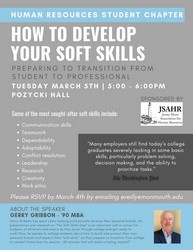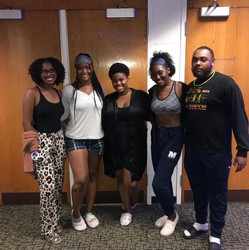Attention students of Monmouth University! Do you think you have what it takes to succeed in a professional interview setting? Think again…
Studies have shown that while some college graduates may have the right technical skills or may have plenty of experience in their field, many are actually lacking essential soft skills.
In basic terms, soft skills make up who you are as an individual. College graduates should be able to confidently maintain eye contact, shake hands well, think critically, communicate efficiently, foster teamwork, have the ability to make decisions, and possess problem solving skills.
The Washington Post reported on this decline of soft skills and analyzed two tests, the Collegiate Learning Assessment Plus and the Association of American Colleges & Universities. The first study was “administered to 32,000 students at 169 colleges and universities. It found that 40 percent of college seniors fail to graduate with the complex reasoning skills needed in today’s workplace.”
The second study found that “would-be graduates said college armed them with the skills needed for the job market.” However, “employers disagreed. On a range of nearly 20 skills, employers consistently rated students much lower than they judged themselves.”
Possible explanations for such a shortage of soft skills in individuals might include: not being taught at an early age at home, students not realizing it or caring enough, or the use of technology.
The Huffington Post reported on this issue and interviewed Melissa Ortega, a child psychologist at New York’s Child Mind Institute. “They don’t know how to handle conflict face to face because so many things happen through some sort of technology. I can’t imagine these kids sitting down in an interview and having a reciprocal conversation easily,” Ortega said.
“They haven’t had these years of learning about awkward pauses. Being able to tolerate the discomfort is not something they’re going to be used to, unless their parents make it a priority,” Ortega continued.
Walt Bettinger, the CEO of Charles Schwab, has a unique interviewing process. Bettinger takes the candidate out to breakfast to witness how they interact with others. Unbeknownst to the candidate, Bettinger informs the manager of the restaurant ahead of time to ensure the candidate’s food order is messed up. Then, Bettinger watches how the candidate responds to it.
In an interview with The New York Times, Bettinger explains this tactic, “I do that because I want to see how the person responds. That will help me understand how they deal with adversity. Are they upset, are they frustrated, or are they understanding? Life is like that, and business is like that. It’s just another way to get a look inside their heart rather than their head.”
Gerry Gribbon, who received his MBA from Monmouth University in 1990, visits many colleges to promote the importance of soft skills. “First impressions are so important in a professional setting. You don’t get a second chance at a first impression,” stated Gribbon.
When he is interviewing a potential candidate for a job position, often times they are lacking the soft skills. For example, if the candidate provides a “dead fish” hand shake, or otherwise a poor hand shake, Gribbon is turned off. He still gives the interviewee a chance; however, the bad impression is already pressed into his mind.
Gribbon personally remembers a four-letter acronym, PAAB, which simply stands for: personality, attitude, actions, and behaviors.
Gribbon says it’s important to notice the impact versus the intent. He shared, “Tone matters. Even though your intent may be good, that doesn’t mean it’s good how you do it.” Being aware of your attitude, language, and body language is crucial.
Employers can be sneaky in their tactics; however, it does show who an individual truly is. Are they speeding into the parking lot and park in the handicap spot? Did they not hold the door open for someone behind them? Are they rude to the janitor or the secretary? These are just some of the considerations employers think about when deciding who receives the job.
There is good news though: it’s not too late to perfect your soft skills! The Human Resources club at Monmouth University is welcoming Gribbon to give a talk to students on how to develop these much-needed soft skills.
The event will take place on Tuesday, March 5, at 5 p.m., in Pozycki Hall. RSVP to the event by Monday, March 4, by emailing ereilly@monmouth.edu.
The hope of this event is to get as many students as possible to attend because it can make a huge difference in students’ lives.
PHOTO COURTESY of Monmouth University




